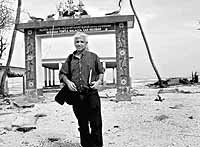SWEDISH
SOUTH ASIAN STUDIES NETWORK
Tsunami Newsletter:
30 December 2004
The Tsunami Disaster Hit Us All!
The death of
thousands and the suffering of millions of people in the massive earthquake
and tidal waves that struck the Indian Ocean shorelines on December, 26,
2004 has made us all realize a sense of belonging together that is rare
in today’s world. Distant natural disasters with thousands of victims
have seldom been met with such a response. This time, because a large
number of tourists were among the victims, the whole world is involved.
Even though it may seem as a time of despair we have to deal resolutely
with the needs of the survivors.
In Europe many of us are deeply involved in the situation of the tourists,
as relatives, friends, work mates or professionals. In Asia there are
also millions of poor people with nowhere to go and who need drinking
water, food and shelter. Without our help more people will die because
of this rather than the tidal waves. In the long run they need help to
reconstruct their life, materially as well as socially.
The victims need to be carefully and patiently listened to, if they are
to overcome their trauma.
The novelist Amitav Ghosh has written
a report on the tsunami disaster in the Andaman and Nicobar islands.
Beyond tsunami: an agenda for action Sida appeal to the Swedish government |
More information about the disaster:
For a worldwide overview:
http://news.bbc.co.uk/1/hi/world/south_asia/default.stm
For newspaper coverage:
Bangladesh
http://www.thedailystar.net
India
http://www.hinduonnet.com
Indonesia:
http://www.thejakartapost.com
Maldives
http://www.haveeru.com.mv
Sri Lanka
http://www.lankapage.com
Thailand
http://www.bangkokpost.com
More Internet news and information sites can be found on:
http://www.sasnet.lu.se/newsf.html
Tsunami Relief
For those wishing to contribute directly via Asian national organisations we here provide some links:
• For relief initiatives worldwide, see:
http://tsunamihelp.blogspot.com
• For government information sites and relief
http://www.happychild.org.uk/nvs/news/
• For relief initiative in Sri Lanka, see for example:
Appeal from the Embassy of Sri Lanka, http://www.sasnet.lu.se/lankaappeal.pdf
(as a pdf-file)
Tsunami disaster assistance information
from IOGT The Swedish temperance organisation IOGT-NTO has been involved in
assistance work in Sri Lanka for many years. After the tsunami hit
the country the organisation is active in all parts of the country.
Information is also provided the whole time on the present situation.
Go to IOGT-NTO’s web page.
The Swedish temperance organisation IOGT-NTO has been involved in
assistance work in Sri Lanka for many years. After the tsunami hit
the country the organisation is active in all parts of the country.
Information is also provided the whole time on the present situation.
Go to IOGT-NTO’s web page.
|
| Appeal from Professor Gananath Obeyesekere On 9 January Gananath Obeyesekere, Professor Emeritus of Anthropology, Princeton University, presented an appeal for academicians all the World over support the relief work carried out in Sri Lanka by the Center for Women’s Research (CENWOR) – run by a group of professionals including past professors in the several universities in Sri Lanka; and the Neelan Tiruchelvam Trust (NTT), named after the Harvard educated human rights activist assassinated a few years ago. Read Prof. Obeyesekere’s appeal (as a pdf-file). |
The Sri Lanka Tsunami Victims Relief Fund made it possible to give Online Donations for Tsunami Victims of Sri Lanka, channeled through the Prime Minister's Office. Go to the web site managed by the University of Colombo School of Computing. http://www.emergencydonations.gov.lk/
• For relief initiatives in India, see for example:
http://www.indiatogether.org/relief/tsunami
The Indian government channels donations through the Prime Minister's National Relief Fund, that contributes aid for affected areas of India, but also sends relief supplies to Sri Lanka and the Maldives. Read an appeal from the Indian Ministry of External Affairs. http://www.sasnet.lu.se/indiaappeal.pdf (as a pdf-file)
If you want to locate a specific relief agency, you can use www.google.com and use the search words ‘Tsunami appeal for relief’ plus the region or country for which you want information, e g ‘Tamilnadu‘ or ‘Sri Lanka‘.
Nordic conferences on the tsunami disaster
Kungliga Tekniska Högskolan (KTH), Swedish Water House and Engineers Without Borders Stockholm (INUG) invited academia (researchers and students), business (companies and professionals) and other organizations to a Swedish Tsunami Conference/workshop on 4 February 2005. The conference was called ”What Can We Do? – Mobilizing technical capacity for South-East Asia”. More information on the conference (as a pdf-file).
A symposium on the ”Tsunami and the Issues of Relief, Rehabilitation and Resettlement” was held in Kolkata, India, on 23 April 2005. The symposium was organised by the Calcutta Research Group (CRG). A report on the symposium was presented in June 2005. Read the report prepared by Paula Banerjee & Sabyasachi Basu Ray Chaudhury, CRG.
The Nordic Institute of Asian
Studies, NIAS, has opened a Tsunami Disaster Portal, with
an aim of providing background information, access to analysis
and research, news about recent events and their implications,
as well as links to reliable sources of further information. Most
of the articles will come from Nordic research institutions, universities,
ministries and aid organisations, but the site will also publish
relevant material from regional research institutions, international
organisations and NGOs.
Yours sincerely,
Staffan Lindberg & Lars Eklund &
Jan Magnusson, SASNET
SASNET - Swedish South Asian Studies Network/Lund
University
Address: Scheelevägen 15 D, SE-223 70 Lund, Sweden
Phone: +46 46 222 73 40
Webmaster: Lars Eklund
Last updated
2010-11-18
SASNET - Swedish South Asian Studies Network/Lund
University
Address: Scheelevägen 15 D, SE-223 70 Lund, Sweden
Phone: +46 46 222 73 40
Webmaster: Lars Eklund
Last updated
2010-11-18
 The
report appeared in three parts in The Hindu 11–13 January
2005. Go for the articles of Amitav Ghosh (on
a photo to the right, in front of the Murugan temple in the devastated
town of Malacca):
The
report appeared in three parts in The Hindu 11–13 January
2005. Go for the articles of Amitav Ghosh (on
a photo to the right, in front of the Murugan temple in the devastated
town of Malacca): 